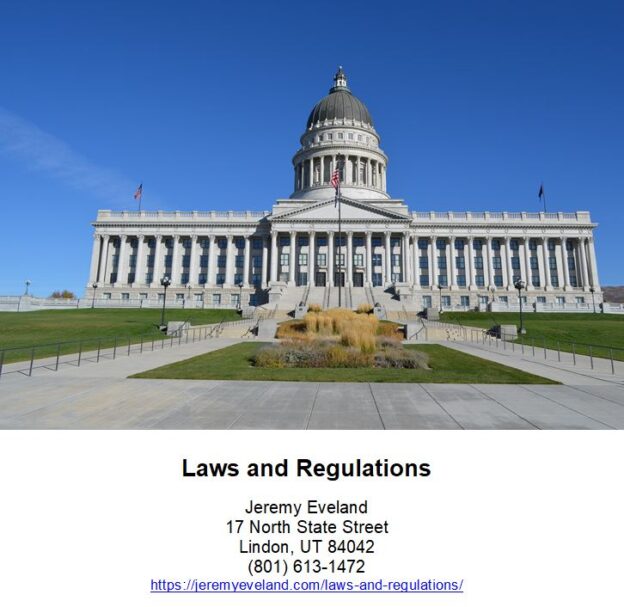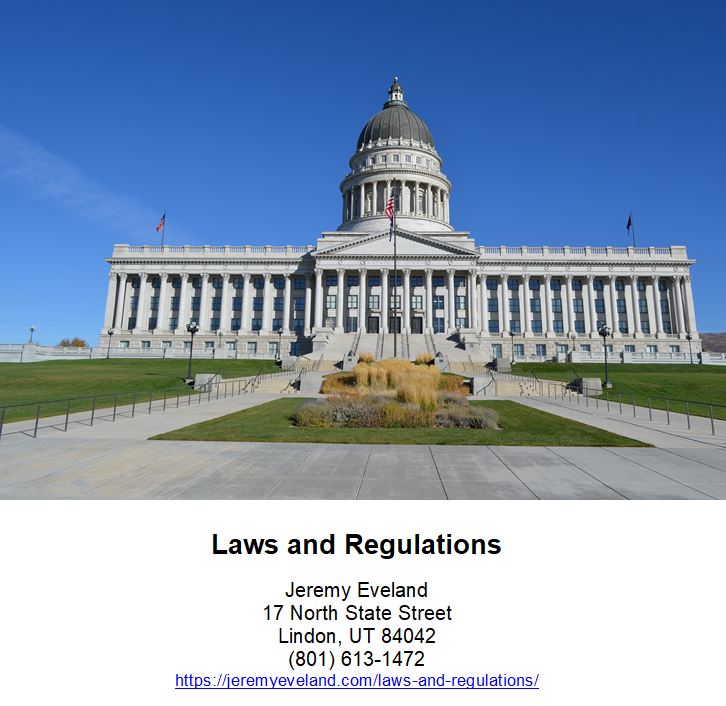Laws and Regulations
-
Attorney at Law
- Introduction
- The Impact of Executive Orders on U.S. Laws and Regulations
- How to Navigate the U.S. Code and Federal Regulations
- An Overview of the Legislative Branch and Its Role in Government
- Exploring the Different Types of Federal Laws
- Understanding the Basics of Utah Business Law
- Regulations of Utah State Departments and Divisions
- Q&A
“Laws and Regulations: Keeping Us Safe and Secure”
Introduction
Laws and regulations are the rules and standards that govern the conduct of individuals and organizations in a society. They are designed to protect the rights of citizens, promote public safety, and ensure the orderly functioning of society. Laws and regulations are created by governments, and enforced by the courts and other government agencies. They can be found in the form of statutes, regulations, and common law. They are essential for maintaining order and stability in a society, and for ensuring that everyone is treated fairly and equally.
The Impact of Executive Orders on U.S. Laws and Regulations
Executive orders are a powerful tool used by the President of the United States to direct the executive branch of the federal government. Executive orders are legally binding directives issued by the President that have the force of law. They are used to direct the executive branch to take certain actions, such as implementing new regulations or policies, or to modify existing laws and regulations.
Executive orders are a powerful tool for the President to shape the law and regulations of the United States. Executive orders can be used to create new regulations, modify existing regulations, or even repeal existing regulations. Executive orders can also be used to direct the executive branch to take certain actions, such as implementing new policies or programs.
Executive orders can have a significant impact on U.S. laws and regulations. Executive orders can be used to create new regulations or modify existing regulations. For example, President Obama used executive orders to create the Deferred Action for Childhood Arrivals (DACA) program, which allowed certain undocumented immigrants to remain in the United States. Executive orders can also be used to repeal existing regulations, such as President Trump’s executive order to repeal the Clean Power Plan, which was designed to reduce carbon emissions from power plants.
Executive orders can also be used to direct the executive branch to take certain actions, such as implementing new policies or programs. For example, President Obama used executive orders to create the Affordable Care Act, which provided health insurance to millions of Americans. Executive orders can also be used to modify existing laws and regulations, such as President Trump’s executive order to modify the Endangered Species Act, which was designed to protect endangered species.
In short, executive orders are a powerful tool for the President to shape the law and regulations of the United States. Executive orders can be used to create new regulations, modify existing regulations, or even repeal existing regulations. Executive orders can also be used to direct the executive branch to take certain actions, such as implementing new policies or programs. As such, executive orders can have a significant impact on U.S. laws and regulations.
How to Navigate the U.S. Code and Federal Regulations
Navigating the U.S. Code and Federal Regulations can be a daunting task. However, with the right tools and resources, it can be a straightforward process.
The U.S. Code is the official compilation of all federal laws. It is organized by subject matter and is divided into 50 titles. Each title is further divided into chapters, and each chapter is divided into sections. The Code is updated annually and is available online through the Government Printing Office website.
The Federal Register is the official daily publication for rules, proposed rules, and notices of federal agencies and organizations. It is published by the Office of the Federal Register and is available online. The Federal Register is organized by agency and includes a table of contents, a list of subjects, and a list of agencies.
The Code of Federal Regulations (CFR) is the official compilation of all regulations issued by federal agencies. It is organized by subject matter and is divided into 50 titles. Each title is further divided into chapters, and each chapter is divided into parts. The CFR is updated annually and is available online through the Government Printing Office website.
The Federal Register and the CFR can be searched by keyword, title, or agency. Additionally, the Government Printing Office website provides a searchable index of the U.S. Code, the Federal Register, and the CFR.
By using the resources available online, it is possible to quickly and easily navigate the U.S. Code and Federal Regulations. With the right tools and resources, it can be a straightforward process.
An Overview of the Legislative Branch and Its Role in Government
The Legislative Branch of the United States government is one of the three branches of government established by the Constitution. It is responsible for making laws, approving the budget, and overseeing the executive branch. The Legislative Branch is composed of the Senate and the House of Representatives, which together make up the United States Congress.
The primary role of the Legislative Branch is to make laws. Congress is responsible for introducing and passing legislation, which is then sent to the President for approval. If the President vetoes the legislation, Congress can override the veto with a two-thirds majority vote in both the Senate and the House of Representatives. Once a bill is passed, it becomes a law.
The Legislative Branch is also responsible for approving the budget. Congress must pass a budget each year that allocates funds for the various government programs and agencies. The budget must be approved by both the Senate and the House of Representatives before it can be sent to the President for approval.
Finally, the Legislative Branch is responsible for overseeing the executive branch. Congress has the power to investigate the executive branch and its agencies, and can issue subpoenas to compel testimony or documents. Congress can also impeach the President or other executive branch officials for “high crimes and misdemeanors.”
In summary, the Legislative Branch is responsible for making laws, approving the budget, and overseeing the executive branch. It is an essential part of the United States government and plays a vital role in ensuring that the government functions properly.
Exploring the Different Types of Federal Laws
Federal laws are laws that are enacted by the United States Congress and signed into law by the President. These laws are the foundation of the legal system in the United States and are binding on all citizens. Federal laws are divided into several categories, each with its own purpose and scope.
The first type of federal law is criminal law. This type of law is designed to protect the public from harm and to punish those who commit crimes. Criminal laws are enforced by federal, state, and local law enforcement agencies. These laws cover a wide range of offenses, from murder and theft to drug possession and fraud.
The second type of federal law is civil law. This type of law is designed to resolve disputes between individuals or organizations. Civil laws are enforced by the courts and can involve a wide range of issues, such as contracts, property rights, and family law.
The third type of federal law is administrative law. This type of law is designed to regulate the activities of government agencies. Administrative laws are enforced by the executive branch of the government and can involve a wide range of issues, such as environmental protection, labor laws, and immigration.
The fourth type of federal law is constitutional law. This type of law is designed to protect the rights of citizens and to ensure that the government operates within the bounds of the Constitution. Constitutional laws are enforced by the Supreme Court and can involve a wide range of issues, such as freedom of speech, the right to bear arms, and the right to privacy.
Finally, the fifth type of federal law is international law. This type of law is designed to regulate the activities of nations and to ensure that they comply with international treaties and agreements. International laws are enforced by the United Nations and can involve a wide range of issues, such as trade, human rights, and the environment.
These five types of federal laws are the foundation of the legal system in the United States. They are designed to protect the rights of citizens and to ensure that the government operates within the bounds of the Constitution. Understanding these different types of federal laws is essential for anyone who wants to understand the legal system in the United States.
Understanding the Basics of Utah Business Law
Understanding the basics of Utah business law is essential for any business owner or entrepreneur operating in the state. Utah business law is a complex and ever-evolving area of law, and it is important to stay up to date on the latest developments. This article will provide an overview of the key aspects of Utah business law and the resources available to help business owners understand and comply with the law.
The first step in understanding Utah business law is to become familiar with the state’s business statutes. These statutes are the primary source of law governing business operations in the state. They cover topics such as formation of business entities, taxation, contracts, employment, and more. It is important to understand the statutes and regulations that apply to your business in order to ensure compliance.
In addition to the statutes, Utah business law also includes common law, which is the body of law developed by courts over time. Common law is often used to interpret and supplement the statutes. It is important to understand the common law principles that apply to your business in order to ensure compliance.
Another important aspect of Utah business law is the Utah Administrative Code. This code contains the rules and regulations that govern the operations of state agencies. It is important to understand the rules and regulations that apply to your business in order to ensure compliance.
It is important to understand the resources available to help business owners understand and comply with Utah business law. The Utah State Bar Association provides a variety of resources, including legal advice, publications, and seminars. Additionally, the Utah Department of Commerce provides information and resources related to business law.
Understanding the basics of Utah business law is essential for any business owner or entrepreneur operating in the state. It is important to become familiar with the statutes, common law, and administrative code that apply to your business in order to ensure compliance. Additionally, it is important to understand the resources available to help business owners understand and comply with the law.
Regulations of Utah State Departments and Divisions
The Utah State Department and Divisions are responsible for the regulation of various activities and services within the state. These regulations are designed to ensure the safety and well-being of the citizens of Utah.
The Utah Department of Health is responsible for the regulation of health care services, including hospitals, nursing homes, and other health care facilities. The Department of Health also regulates the practice of medicine, nursing, and other health care professions.
The Utah Department of Transportation is responsible for the regulation of motor vehicle safety, including the licensing of drivers, the registration of vehicles, and the enforcement of traffic laws. The Department of Transportation also regulates the construction and maintenance of roads and highways.
The Utah Department of Environmental Quality is responsible for the regulation of air and water quality, hazardous waste management, and the protection of natural resources. The Department of Environmental Quality also regulates the disposal of solid and hazardous waste.
The Utah Department of Public Safety is responsible for the regulation of public safety, including the enforcement of criminal laws, the protection of citizens from crime, and the regulation of firearms. The Department of Public Safety also regulates the operation of motor vehicles and the licensing of drivers.
The Utah Department of Workforce Services is responsible for the regulation of labor and employment, including the enforcement of labor laws, the protection of workers’ rights, and the regulation of wages and hours. The Department of Workforce Services also regulates the operation of businesses and the licensing of employers.
The Utah Department of Agriculture and Food is responsible for the regulation of agricultural activities, including the inspection of food products, the regulation of pesticides, and the protection of agricultural resources. The Department of Agriculture and Food also regulates the sale of agricultural products.
The Utah Department of Natural Resources is responsible for the regulation of natural resources, including the protection of wildlife, the management of public lands, and the regulation of water resources. The Department of Natural Resources also regulates the use of public lands for recreational activities.
The Utah Department of Commerce is responsible for the regulation of business activities, including the licensing of businesses, the enforcement of consumer protection laws, and the regulation of financial institutions. The Department of Commerce also regulates the sale of securities and the operation of insurance companies.
Q&A
Q: What is the purpose of laws and regulations?
A: The purpose of laws and regulations is to protect citizens and ensure that everyone is treated fairly and equally under the law. Laws and regulations also help to maintain order and stability in society by providing a framework for how people should behave and interact with each other.
Laws and Regulations Consultation
When you need legal help with Laws and Regulations call Jeremy D. Eveland, MBA, JD (801) 613-1472 for a consultation.
Jeremy Eveland
17 North State Street
Lindon UT 84042
(801) 613-1472
Related Posts
Business Transaction Lawyer Provo Utah
Trusted Personal Injury Attorneys in Utah
Legal Requirements to Start a Business
Real Estate Attorneys in Salt Lake City Utah
Business Contract Lawyer Riverton UT
Business Law and Intellectual Property
Commercial Litigation Strategies








